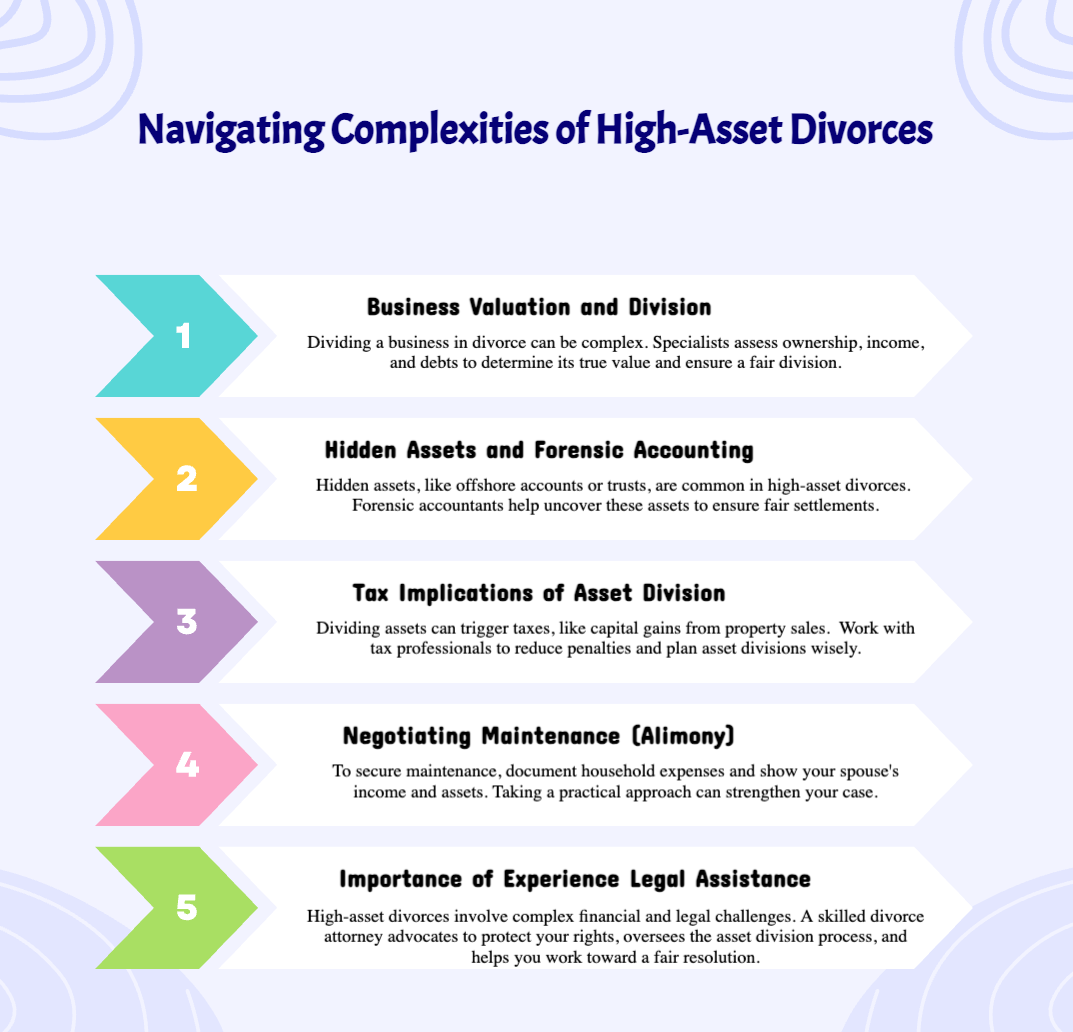While every divorce is unique, high-asset divorces bring a specific set of challenges. They often involve complex financial holdings like pensions, retirement accounts, and business ownership. These issues can create significant hurdles, whether children are involved or not. For high-income earners or those with substantial assets, navigating these complexities requires careful planning to ensure a fair resolution. This article highlights key steps and tips to protect your wealth during a high-asset divorce. We’ll discuss the role of forensic accountants, the importance of accurate asset valuations, and strategies to avoid costly mistakes.
Key Takeaways Infographic: Navigating a High Asset Divorce
Common Issues in High Asset Divorce and What You Can Do About Them
High-asset divorces come with specific complexities that require careful legal and financial management. Here are some of the key issues individuals face in these cases:
1. Business Valuation and Division
If you or your spouse owns a business, determining its true value can be a challenging process. The business’s ownership structure, income streams, and assets and liabilities all factor into its valuation. Accurate valuation is essential to prevent one spouse from walking away with a disproportionate share of the business.
This complexity requires third-party experts, such as forensic accountants or valuation experts, to ensure the business is valued accurately. Failing to secure proper valuations may lead to significant financial loss.
For more in-depth guidance on how business valuations work during a divorce, read our related article: Business Valuation in Divorce: What You Need to Know for Planning.
2. Complex Financial Instruments (Stock Options, Deferred Compensation)
High-asset divorces often involve financial compensation structures beyond a simple salary. Stock options, deferred compensation, and executive benefits can significantly complicate asset division. Understanding how to fairly split unvested stock or future payouts is crucial in ensuring a fair division.
For example, deferred compensation plans may only be paid out years down the road, but their future value must still be accounted for in today’s settlement. Your attorney should work with financial
3. Hidden Assets and Forensic Accounting
In high-asset divorces, there’s a greater likelihood of hidden assets. Whether intentional or not, assets may be hidden in offshore accounts, trusts, or underreported income.
Forensic accountants play a critical role in uncovering these hidden assets, ensuring that both parties have a full understanding of the marital estate. Your lawyer won’t be putting the numbers together or discovering where certain accounts are, but your lawyer’s understanding of the process is imperative. You and your lawyer will likely have a feeling that there are hidden assets based on the information received from your spouse in the discovery process.
Proving there are hidden assets and putting the information before the Court properly is important. Many people know that their spouse is skimming money from the family business or using creative accounting, but you’ll likely need an expert to prove your case. A high-asset divorce lawyer should be familiar with the process.
Without a thorough review of financial records, one spouse could end up with far less than they’re entitled to.
Visit our High Asset Divorce Attorney services page to learn more
4. Real Estate Portfolios and Luxury Assets
High-asset couples often own multiple properties and luxury assets, which must be accurately valued and divided. Properties such as vacation homes, investment properties, and even commercial real estate require detailed appraisals to ensure their value is appropriately represented in the divorce settlement.
In addition to real estate, luxury assets like art collections, jewelry, and vintage cars can be difficult to divide fairly. These unique assets are often difficult to liquidate and require expert appraisals to ensure they’re split appropriately.
5. Tax Implications of Asset Division
Another significant concern in high-asset divorces is the tax impact of asset division. For example, selling real estate or investments could trigger capital gains taxes, which could reduce the actual value of the assets. Similarly, dividing retirement accounts could lead to penalties and tax liabilities if not handled correctly.
Working with tax professionals ensures that these tax implications are considered and minimized during the divorce process.
Want to avoid common mistakes in high-asset divorces? Read more about what to avoid in this blog post: Common Mistakes to Avoid in High Asset Divorce.
Dividing assets during a divorce requires clear and accurate evaluations. You may need professionals to appraise real estate, analyze stock options and deferred compensation, and determine the value of luxury items like art or jewelry. These steps give the court the facts to make fair decisions and help you address any tax consequences directly.
Seeking Maintenance (Alimony) from a High Earner Spouse
For the non-working spouse or the one seeking maintenance, proving your spouse’s income and assets is crucial in a high-asset divorce. You may not be involved in the day-to-day finances of your spouse’s employment, but you can strengthen your case for spousal support by following these tips:
1. Gather Documents and Financial Records.
Secure all available financial records. If your spouse has been discarding or hiding documents, check shared spaces like home offices or file cabinets for overlooked items such as envelopes or statements. Even discarded envelopes from banks or financial institutions can reveal hidden accounts or assets. Share these findings with your attorney, who can subpoena additional records as needed. For example, one client discovered critical financial documents in the trunk of her husband’s car, which became key evidence in securing fair maintenance.
2. Track Your Expenses:
Track your household spending carefully. Record monthly costs for childcare, mortgage payments, school tuition, and daily living expenses. This information forms the foundation of your spousal support request. Courts often strive to maintain the standard of living established during the marriage, so providing accurate and detailed expense reports will support your claim for a fair maintenance settlement.
3. Educate Yourself: Learn about your Family’s Finances.
If you are unfamiliar with the family’s finances or don’t know much about your spouse’s compensation package, it’s time to educate yourself. Learn about the financial details of your spouse’s income, including stock options, bonuses, and executive benefits. If this is unfamiliar territory, consult a financial advisor or accountant who can explain these assets and their implications for divorce settlements. Knowledge of how courts typically handle such assets will give you an advantage in negotiations
4. Be Reasonable
Approach maintenance discussions with practical and reasonable expectations. If your family didn’t spend $20,000 a month during the marriage, asking for that amount may hurt your credibility. Courts aim for fairness, considering both the marital lifestyle and each party’s financial recovery after divorce. Keep in mind that a high earner may have a greater ability to rebuild their finances. A balanced approach can lead to a more favorable outcome and reduce the emotional toll of prolonged litigation.
For more detailed advice on negotiating spousal support in high-asset divorces, read our blog: NavigatingAlimony Negotiations in High-Asset Illinois Divorces.
Protect Your Assets with An Experience in High Asset Divorce Attorney
Navigating a high-asset divorce requires both legal experience and a deep understanding of financial complexities. Working with the right experts, such as forensic accountants, property appraisers, and valuation and tax professionals, is essential to securing a fair financial settlement. One of the best ways to protect your assets is to hire an experienced high-asset divorce attorney.
At Anderson Boback & Marshall, we are experienced in high-asset divorces, ensuring that your assets are accurately valued and your rights are protected throughout the process. Contact us for a consultation and get the guidance you need for a secure and favorable outcome.
















